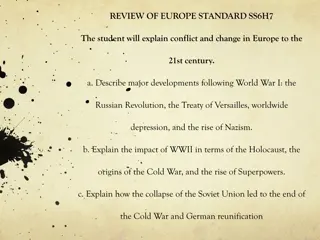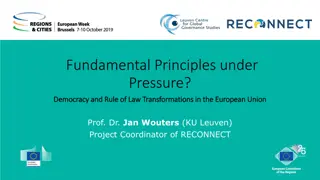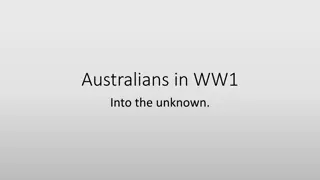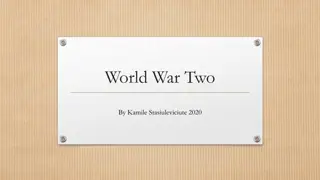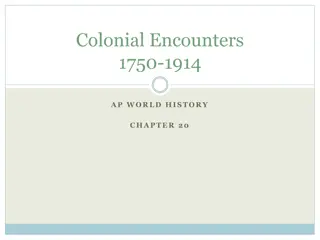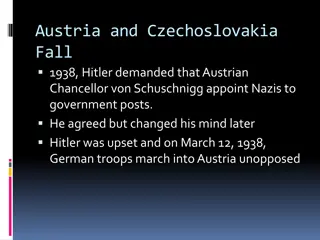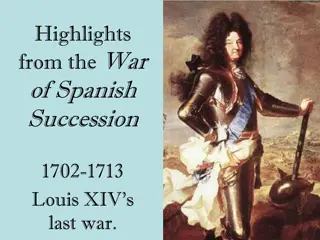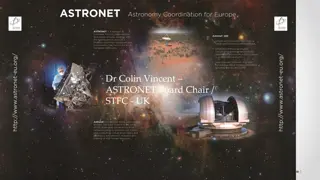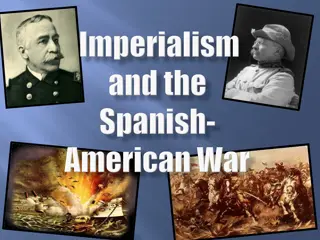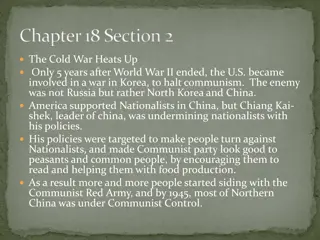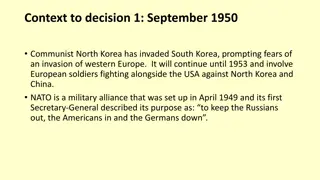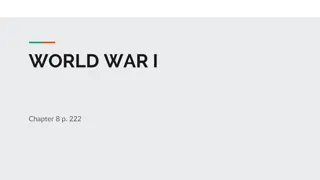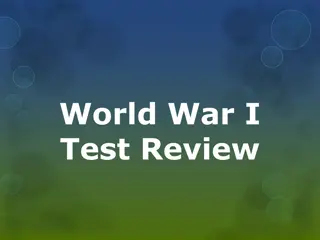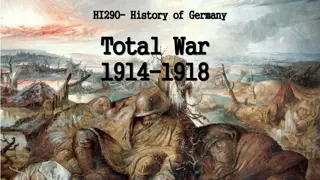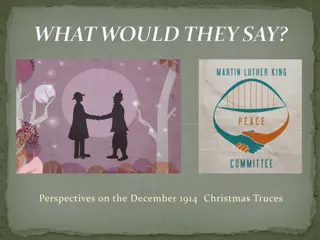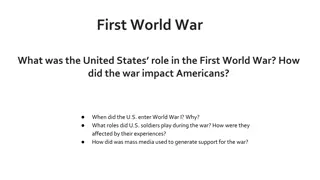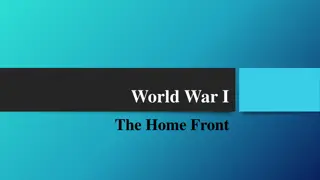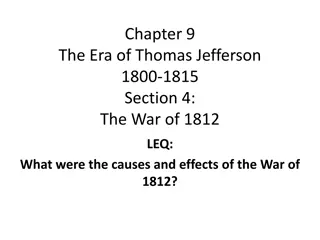European Rearmament and the Inevitability of War by 1914
The content delves into the factors leading to the inevitability of war in 1914, focusing on European rearmament, the Anglo-German naval rivalry, and geopolitical alliances like the Entente Cordial. It examines events such as the Scramble for Africa, the Two Power Standard, and the role of countries in the Balkans. Source analyses and discussions on the significance of naval races and military preparedness are explored in depth.
Download Presentation

Please find below an Image/Link to download the presentation.
The content on the website is provided AS IS for your information and personal use only. It may not be sold, licensed, or shared on other websites without obtaining consent from the author.If you encounter any issues during the download, it is possible that the publisher has removed the file from their server.
You are allowed to download the files provided on this website for personal or commercial use, subject to the condition that they are used lawfully. All files are the property of their respective owners.
The content on the website is provided AS IS for your information and personal use only. It may not be sold, licensed, or shared on other websites without obtaining consent from the author.
E N D
Presentation Transcript
Starter Quiz TASK: Please write down the title, and 1-9 in your margin on a new sheet of paper. 2. Who was the Entente Cordial between? 1. Define Weltpolitik 3. 4. In which country did France get a free hand as a result of the Entente Cordial? 5. Define the Scramble for Africa 6. Explain the two power standard 9. List three countries that are in the Balkans 7. 8. Last lesson = 1 pt Last week = 2 pt Last term = 3 pt
Last lesson = 1 pt Last week = 2 pt Last term = 3 pt 1. Aggressive foreign policy leading to Germany having an important role in the world 2. England and France 3. 5. Period in African history where European powers colonised Africa 6. Law stating that the British navy had to be more powerful than the next two most powerful nations 4. Morocco 9. Bosnia, Serbia, Montenegro, Bulgaria, Romania 7. 8.
Source Practice Source 8 and Figure 10 on p.206 Study Sources 8 and 10. How useful are Sources 8 and 10 to a historian studying the Anglo-German naval rivalry NOT USEFUL USEFUL
Source Practice SOURCE What does the Source tell you Why would this be useful What limits the usefulness of the source Source A Source B Good learning: Understand the events of the Naval Race Great learning: Explain the motives of Britain and Germany Even better: Evaluate the significance of the naval race
European rearmament Using the information on p207 including Figure 13 produce a diagram summarising how the different countries had prepared for war by 1914. All the talk of war and arms race made war inevitable in 1914 How far do you agree with this statement? Explain your answer. Good learning: Understand the events of the Naval Race Great learning: Explain the motives of Britain and Germany Even better: Evaluate the significance of the naval race
European rearmament All the talk of war and arms race made war inevitable in 1914 How far do you agree with this statement? Explain your answer. Introduction Was inevitable Was not inevitable Conclusion Explain talk of war and arms race Germany making Schlieffen Plan Size of some armies was going down Your view Define inevitable Setting up of BEF and France s Plan 17 Armies for defence not attack Expense of Naval Race Good learning: Understand the events of the Naval Race Great learning: Explain the motives of Britain and Germany Even better: Evaluate the significance of the naval race
Conflict and Tension Lesson 4: Morocco and Bosnia Even better: Evaluate the impact of this crises on international relations Great learning: Explain the causes and consequences of the different crises Good learning: Understand the two Moroccan Crises and the Bosnian Crisis Key Words:
Good learning: Understand the two Moroccan Crises and the Bosnian Crisis Great learning: Explain the causes and consequences of the different crises Even better: Evaluate the impact of this crises on international relations
The Moroccan Crises and Bosnian Crisis Each table will be given either one of the Moroccan Crises, or the Bosnian Crisis. TASKS 1. Stick the overview of the crisis in your book 2. Highlight 5 key phrases that could be used to summarise your event 3. On your table you are going to create a poster on your crisis. You need to focus on: a) chronology b) what/who was causing tension & why c) The consequences of that tension on international relations (how did countries react/feel about what was happening at various points in the crisis).
Write an account of how events in Morocco became an international crisis in 1905 and 1906. Write an account of how events in Bosnia became an international crisis in 1908. Write an account of how events in Morocco became an international crisis in 1911. Good learning: Understand the two Moroccan Crises and the Bosnian Crisis crises international relations Great learning: Explain the causes and consequences of the different Even better: Evaluate the impact of this crises on
Knowledge Quiz 1. In which crisis did Kaiser Wilhelm enter Morocco on a white horse? 2. What was the outcome of the Algeciras Conference for Germany? 3. In which crisis did France gain joint control of the Moroccan police with the Spanish? 4. Where did Austria-Hungary take over in the Bosnian crisis? 5. What was the name of the gunboat sent to Morocco in the 2nd Moroccan Crisis? 6. In which crisis did France take full control of Morocco? 7. Which countries backed down to Germany in the Bosnian Crisis? 8. How did Britain show it was willing to fight Germany in the second Moroccan Crisis? 9. Which country had been in control of the Balkans for centuries? 10. In which crises was the Entente Cordial challenged?
In 1911, Frances influence in Morocco was growing, but Germany wanted a better share in economic potential Morocco had to offer. Therefore, when the Moroccans rebelled against their Sultan, Germany made a speech in which he said he would support the Sultan. Kaiser Wilhelm II also sent a gunboat called the Panther to Morocco. This was seen as a deliberate challenge to France s plan to control Morocco, which had been agreed by Britain according to the terms of the Entente Cordiale. The crisis escalated as the powers reacted to events France and Britain were angry at the Kaiser s interference, and, in 1906 challenged him at the Algeciras Conference. At the conference the Kaiser was forced to back down. He felt humiliated, isolated and bitter because of a perceived threat from the strengthening Entente Cordiale. Events in Morocco became an international crisis because the Kaiser was made a speech which promised to support the Sultan of Morocco. This German interference in Moroccan affairs angered France. Germany also sent a gunboat to Morocco.
Level 4 Marks ( /8) 7-8 What you need to do Complex analysis of causation/consequence. The answer is presented in a coherent narrative/account that demonstrates a range of accurate and detailed knowledge and understanding that is relevant to the question. Developed analysis of causation/consequence Answer is presented in a structured and well -ordered narrative/account that demonstrates a range of accurate knowledge and understanding that is relevant to the question Simple analysis of causation/consequence Answer is presented in a structured account that demonstrates specific knowledge and understanding that is relevant to the question. Basic analysis of causation/consequence Answer is presented as general statements which demonstrates basic knowledge and understanding that is relevant to the question. 3 5-6 2 3-4 1 1-2
Level Marks ( /8) What you need to do 4 7-8 I progress from a developed narrative of causation/consequence with complex sequencing and reasoning supported by a range of accurate and detailed factual knowledge and understanding which might be related, by showing understanding about how much each part of the sequence increased tension and led to a crisis. I progress from a simple narrative of causation/consequence with developed sequencing and reasoning supported by a range of accurate factual knowledge and understanding which might be related by analysing how/why tension increased at one stage in the process. 3 5-6 2 3-4 I progress from a basic narrative of causation/consequence by showing a simple understanding of sequencing, supporting it with factual knowledge and understanding. I can identify cause(s)/consequence(s) about the events 1 1-2
0 9 Write an account of how events in Morocco became an international crisis in 1911 [8 marks] 0 9 Write an account of how events in Morocco became an international crisis in 1905 and 1906. [8 marks] Which caused more tension between the Great Powers in the years 1905 to 1911: events in Morocco, 1905.1911; events in Bosnia, 1908.1909? You must refer to both reasons when explaining your answer.


